|
Versión en español
It's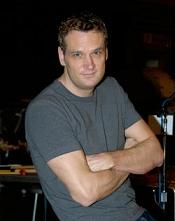 hard to know the true meaning of the word "creative" without knowing the career of this artist: musician, director, editor... Impressive! With such activity and his experience in mystery and thriller films we don't know how he can sleep at night. We had the pleasure of interview him last 18th of April during 40 unforgettable minutes. hard to know the true meaning of the word "creative" without knowing the career of this artist: musician, director, editor... Impressive! With such activity and his experience in mystery and thriller films we don't know how he can sleep at night. We had the pleasure of interview him last 18th of April during 40 unforgettable minutes.
John, thanks very much for your kindness, but specially thanks for your dedication to the cinema!
Madrid (Spain), 18th of April 2005
A distant bell rings...
BSO Spirit (BS): John Ottman? Hello, This is José Luis
Chellini, from BSOSpirit (Spain).
John Ottman (JO): Hi! What can I do for you?
BS: This is going to be a phone interview. Are you ready?
JO: Yes. Please, go on.
BS: Since you were
almost a kid, you have been attracted by show-business... It has been said that
you used to write and then record radio plays on a tape, using your neighborhood
friends as extra cast members. You also used film music to be filled in those
plots...
JO: (laughs) Those were very exciting times. I was a fan of Jerry Goldsmith, and many of his film themes were indeed used for that kind of entertainment. Then came the music of John Williams and James Horner.
I’ve been very much inspired by the work of these three musicians.
BS: 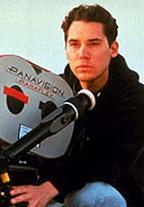 During your days at the U.S.C. Film School you ended up winning the Student’s Academy Award with Summer Rain. According to my sources, director Bryan Singer was then your production assistant... During your days at the U.S.C. Film School you ended up winning the Student’s Academy Award with Summer Rain. According to my sources, director Bryan Singer was then your production assistant...
JO: You are right. I met Bryan on the making of that project, and we became immediately friends. We have worked together many times since then. He also worked on the sound and, in fact, I learnt many things from him about how to make a movie.
BS: Wasn’t Bryan Singer the one who introduced you to the art of score making?
JO: At first, I just wanted to do my own movies, and worked on the music as a hobby. It was certainly Bryan who kept on proposing me to score film music, but in the 80s I wasn’t decided yet. Once, however, Bryan was working on a film and the composer left at the last minute, so he urgently asked me to write the score, which I did, and that was how I started composing film music.
BS: 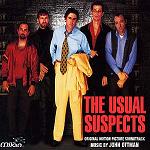 After working with Bryan in the Sundance Grand Jury Prize winner film, Public Access, everything seemed much prepared for a merging in The Usual Suspects... After working with Bryan in the Sundance Grand Jury Prize winner film, Public Access, everything seemed much prepared for a merging in The Usual Suspects...
JO: That film was a true adventure. Bryan wanted to direct a plot written by one guy he knew a long time ago in New Jersey, but when they put it all together they realized that there was no money. So Bryan was skillfully bold enough to ask the actors to bring their money in so the movie could be shot and edited. Actually the project had fallen apart, and producers were very skeptical about the movie... Bryan insisted on them that he had already the acting crew and a musician for the score (which was me). It was a miracle that the film could last, and it was certainly a success.
For me this was a peculiar challenge, because it was the first time to ever work with an orchestra, and I needed to learn many things.
BS: 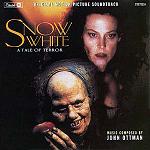 However, on Snow White: A Tale of Terror you wrote a huge score for big orchestra and chorus. How many players did you use, and how did you get those strange whispering voice effects that appear in the score? However, on Snow White: A Tale of Terror you wrote a huge score for big orchestra and chorus. How many players did you use, and how did you get those strange whispering voice effects that appear in the score?
JO: I remember I had to work very hard on that movie. First we recorded a string section using about 60 players, then used a total of 100 musicians. The whispering effect was my own idea, and I performed it myself using a multi-track sampler. Unfortunately, some themes were kept out from the film, and this is something very sad for a composer.
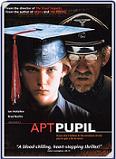
BS: Another funny idea was to use a fragment of a German waltz in a score such as the one written for Apt Pupil.
JO: This was another difficult task. I had to write a score for a very bizarre film which was funny at the same time, and I used that piece of music for a scene in which the main character seems to reconsider his own life. I wanted to transmit a happy feeling... My view about that film was a sort of mixture between 2001 and 1941.
BS: How do you compose? Do you start with a main theme and then fulfill some atmospheric music?
JO: I start thinking on the atmosphere. I always deepen in the story and think a plan for the music. The main theme is developed later on, depending on the tone or the temperature of the music that I use.
BS: You not only compose the film themes, but sometimes edit them as well. Is this a hard labor? Do you need the director’s approval before deciding on which music to put?
JO: You always have to submit the music to the director’s approval, even with Bryan, who is my friend. When you edit it, and the director happens to be a friend of yours, things are quite easier. But I have recently presented a project for a score in a room with 10 crew members, and I had to listen to each one’s opinion... This is also a part of this job. It is something which happens to all composers.
Being a music editor is always an advantage. In fact, I think that the editor is one of the leaders of a movie.
BS: How did you meet your partners Larry Groupé and Damon Intrabartolo, who have orchestrated and conducted most of your scores?
JO: Larry was writing jingles at the time I was going to work with orchestral music for films, so I asked him to be involved in it, together. He had previously worked on computers, but he was very good on writing music for an orchestra.
Concerning Damon, he was a student at the time I worked for Usual Suspects. He witnessed my job carefully and learnt how to orchestrate. We three are very fond collaborators.
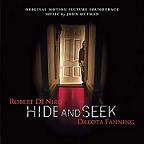
BS: In Hide and Seek and Imaginary Heroes you started a joint venture with Deborah Lurie in the score making process. How it all did start?
JO: The producers wanted a score with some songs in it and also some source music to be developed. Debbie and I worked together in that direction. I composed a theme which she later adapted. We understood each other very well.
BS:  Then you had the chance to work on an epic film such as X-2, a blockbuster. A dream come true? Then you had the chance to work on an epic film such as X-2, a blockbuster. A dream come true?
JO: It was a very exciting project and, certainly, my first opportunity to work on a big movie. However, my dream as a composer is still to write a score for a romantic film, the way John Barry did in Dances with Wolves, for instance.
Bryan worked with Michael Kamen in X-Men, but wanted me to write the score for X-2, and this turned out to be another challenge in my career. This was my first chance to write powerful music like Star Wars or Star Trek... I needed to capture in that film all the heroic qualities of the X-Men as well as the heroic sacrifice of Jean Grey and the traitorous decision of Pyro. This was an all dramatic atmosphere which brought to me a lot of creative opportunities.
BS:  Which X-Men character did inspire you most? Which X-Men character did inspire you most?
JO: The one of Wolverine, maybe. This theme shifts and transforms itself when Wolverine shows how wild he can be, but the leitmotiv is still evoked.
BS: 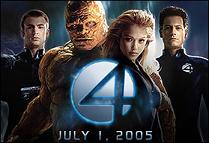 Then came The Fantastic Four, in which you certainly won a place among big superhero musicians, such as John Williams or Danny Elfman... Then came The Fantastic Four, in which you certainly won a place among big superhero musicians, such as John Williams or Danny Elfman...
JO: Maybe... I took my responsibility with that score full of expectations. I was conscious that many people were waiting for “the music” for those characters. However, I should say that the movie turned out to be more a light comedy than a big epic film.
I assume I had no idea about who the Fantastic Four were before being involved in the movie... I never red the comic... I was very busy watching the Star Trek saga at that time, when I was a kid. So I worked following the topic skills for such a project. Of course I needed a huge orchestra, and I wrote the score somehow following the steps of X-2.
BS: Did you conceive a particular theme for each hero?
JO: Not really, but I wanted, instead, a very nostalgic theme for Dr.
Doom,
a different theme evoking the nostalgia of the past, working a lot on the string
section instructions.
BS: But your greatest challenge, so far, must be the score that you are still preparing for a new film on Superman...
JO: You are right. It is an exciting project, but very embarrassing as well. The script isn’t finished yet, so I still don’t know what music to write... I have been thinking on putting very new music into it or adapting the so well known music written before by maestro John Williams... It is a tough decision. On one hand, many Superman fans want the main theme to be always the Superman theme, so I should consider this and use the main theme, maybe with an adapted tempo or played in a different way... I still have to decide.
BS:  Whatever you do, you are doom to be compared to Williams for scoring this... Whatever you do, you are doom to be compared to Williams for scoring this...
JO: Yes, I know. But I very much think of respecting his own main theme and adding new music for the scenes.
BS: Do you see yourself as another superhero film composer?
JO: I guess I’ll be seen that way, but I cannot put myself in Williams’ or Elfman’s places. I enjoy writing epic music, and I hope that film watchers enjoy my music so well.
BS: This is the final question. Computers and samplers are ruling music labs work... How do you think that film music will evolve during this century?
JO: We have become richer in terms of new technical devices to be able to write better, quicker devices to produce new sounds; however, orchestral music will be always necessary in screen compositions. I remember that in the 80s everyone thought that orchestral scores had come to an end and electronic music was taking the lead. However, the powerful music written by Williams and many others using very big classical orchestras turned out to be a successful one. So we still have a lot to learn about the classic film composers in order to open real new paths.
BS: OK, John. That's all. Thanks very much for this interview and goodbye.
JO: You're welcome! Goodbye!
Interview by José Luis Díez Chellini
Questions by Asier G. Senarriaga
Transcription by Jordi Montaner
|





